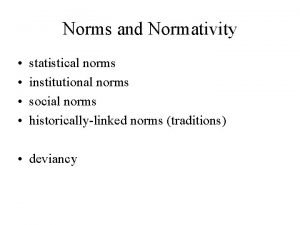Legal norms Legal norms definition l l Legal














- Slides: 14

Legal norms

Legal norms – definition l l Legal norms are generally binding rules of conduct issued by the state authority Legal norms are intended for the regulation of social relations Legal norms determine the rights and duties of the subjects of legal relations Abidance of legal norms is guaranteed by the state coercion

Basic aspects of legal norms l l l They are issued by competent state authority They are properly published (Collection of laws) Normativity – they regulate peoples conduct Generality – they are binding for the indefinite number of people and indefinite number of cases They are enforceable by the power of the state

Types of legal norms I. l l l Injunctive legal norms – they determine duties of the legal subjects § 6 Civil Code: Everyone has the duty to act in legal transactions honestly. Prohibitive legal norms – they determine prohibitions § 673 Civil Code: Marriage can not conclude the person whose legal capacity was limited in this area. Entitling legal norms – they determine entitlements of the legal subjects § 1485 Civil Code: The heir has the right to refuse the inheritance after the death of the deceased.

Types of legal norms II. l l Peremptory (mandatory) norms – formulated as imperatives, subjects cannot behave in a different way § 1016 Civil Code: Fruit fallen from trees and shrubs on neighboring land belongs to the owner of neighboring land. Provisional (non-mandatory) norms – they contain two rules – first enables legal subjects to arrange their rights and duties, second will be used if they do not arrange § 1958 Civil Code: If the parties do not arrange the time when the borrower should fulfil the debt, the creditor may require payment immediately and the borrower is then obliged to fulfil without undue delay.

Special legal norms I. l Declaratory legal norms – they express ideological, political or ethical principles l § 2 Act on Illegality of the Communist Regime and on Resistance Against It: Czechoslovak communist party was a criminal and contemptible organization just as other organizations based on the same ideology which violated human rights and principles of a democratic state. l Legal definitions – they define some notions used in the process of realization of law l § 606 Civil Code: Half of a month shall be defined as fifteen days and its center is the fifteenth day.

Special legal norms II. l Derogatory norms – they contain repeal of a normative act or its part l § 3080 Civil Code: Following acts are repealed: 1) Act No. 40/1964 Coll. , The Civil Code ……. . l Conflict norms – they contain criteria for the choice between the norms of two or more countries l § 48 Act on Private International Law: The eligibility of a person to marry as well as the conditions for the validity of marriage are governed by the laws of the State of which he is a citizen.

Temporal activity of legal norms l l l Validity of legal norms – moment from which the norm is a part of legal order, norm is valid from the moment of its publication Effectivity of legal norms – moment from which the norm is binding for the subjects of law, it is in the last provision of normative act Vacatio legis – period of time between validity and effectivity

Termination of validity l l l Lapse of time – validity is limited in the moment of the adoption of the legal norm Explicit derogation of the norm by the competent state authority Automatic derogation by the adoption of a new normative act which regulates the same relations – lex posterior derogat priori (without derogatory clause)

Derogatory clause l l l Enumerative derogatory clause – enumerates all the derogated legal norms or whole normative acts General derogatory clause – derogates all legal norms contrary to the new normative act General derogatory clause with the examples of derogated norms

Retroactivity of legal norms l l True retroactivity – legal norm influences also the legal relations which originated before its effectivity Pseudo-retroactivity – origin and validity of old legal relations is under influence of derogated norm, next continuation of legal relations is under influence of a new norm

Territorial activity of legal norms l l l Based on the territorial principle – norms are binding on the territory according to competence of state authority which adopted the normative act Territory of the state includes earth surface, internal waters, coastal waters, underground airspace Fictitious territory – boards of aircrafts and ships

Personal activity of legal norms l l l Legal norms are binding for all persons on the territory of a particular state Some legal norms are binding only for smaller number of persons (soldiers, public officials) Diplomatic and legislative immunity – exemptions from the activity of criminal law

Subject-matter activity of legal norms l l l Legal relations which are regulated by particular legal norm Mostly regulated in the first provision of a normative act General v. special legal norms – principle „lex specialis derogat legi generali“ – special norms have priority over general norms
 Lll meaning urban dictionary
Lll meaning urban dictionary Norms psychology definition
Norms psychology definition Staffing norms definition
Staffing norms definition Norms and values definition sociology
Norms and values definition sociology Informal group norms
Informal group norms What does aimsweb measure
What does aimsweb measure Unit 2 teams working together
Unit 2 teams working together Norms and mores examples
Norms and mores examples Values vs norms
Values vs norms Doreen
Doreen Examples of level three questions
Examples of level three questions The remote norm of morality
The remote norm of morality Enni narrative
Enni narrative Socratic seminar norms
Socratic seminar norms Nature of culture
Nature of culture

























